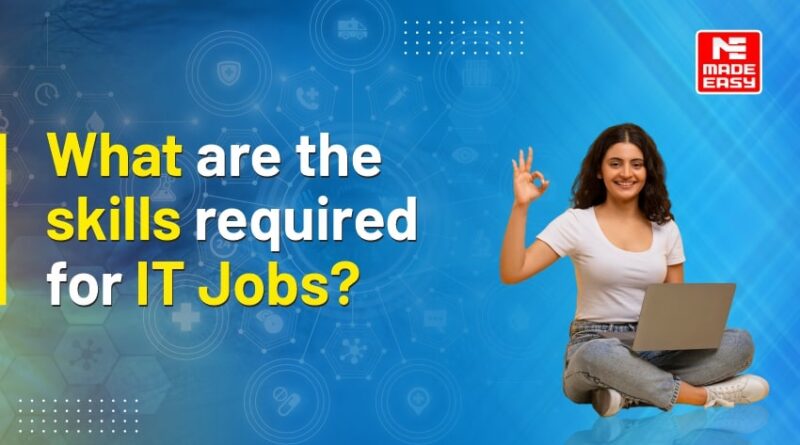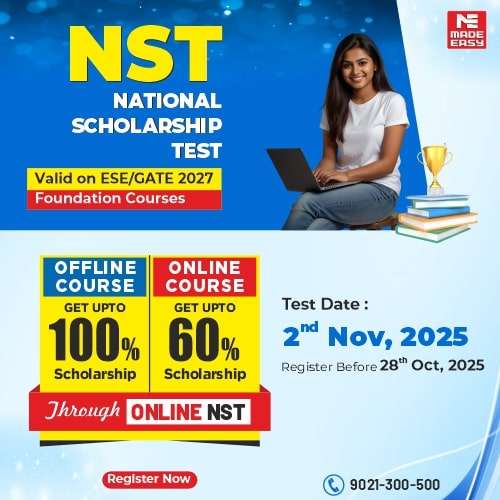What are the skills required for IT Jobs?
Hey budding engineers! Are you in doubt of what skills to learn to secure an IT Sector Job? In today’s tech driven modern world, the demand for skilled engineers is on surge. Technical industry is looking for young individuals for several profiles such as software developers to cybersecurity. The industry is seeking young engineers who have a wide range of skills and interests in information technology (IT).
Now as a reader you must be wondering what all skills to learn for an IT sector job. Our blog will take you on a journey of explaining what is an IT job, what all skills are required for IT placements along with various job profiles, their roles, and how MADE EASY can assist you in securing an IT sector job. So let’s begin with knowing everything about the IT sector.
What is an IT Job?
In today’s modern world, engineering college grads are looking for IT sector jobs as it is considered to be the most sought job opportunity post engineering degree. IT sector jobs have several job profiles such as software development, data analyst, web developer, cybersecurity expert, machine learning engineers etc. with responsibilities like development and management of systems and applications related to IT. These job profiles contribute to various industries which rely on IT systems for their businesses.
The IT sector offers various career growth opportunities and a platform for innovations and so it is an evolving sector. Use of IT systems can be seen from big scale global businesses to small scale businesses. Use of computers, networks, and softwares to access the information can be seen in every sector. And so an IT professional comes into the picture to develop, manage along with maintaining IT systems, data management, communication etc. which enhances productivity.
Private companies like Google, Amazon, Microsoft, Facebook, Apple, Accenture, IBM, Infosys, TCS etc are some of the global companies providing IT roles to the individuals along with training to help new hires to have an opportunity to grow.
India can see a significant growth economically especially in IT from the past few decades. Globally, India is considered a hub for technology and innovation and so we can see 7.4% of India’s IT sector contribution to GDP. And so this showcase IT sector jobs have the potential to pursue a career in.
Table of Contents
IT Job Description: Roles and Requirements
IT, commonly known as information technology, is a high in demand sector and provides promising career opportunities for the engineering graduates. As we mentioned the sudden surge of IT professionals worldwide, we’ll move further in exploring the IT jobs description: what are the roles and skills required to secure a place in such IT profiles.
Software Developer
Software developers are IT professionals who deal with various software applications which involves creating, designing, coding, testing and managing them. Software applications are user friendly tools which aim to perform specific tasks on mobile or desktop. Some examples of commonly used softwares are Internet browsers, Multimedia softwares, Communication softwares etc.
The roles associated with a software developer are coding and development, testing and debugging, designing the software etc are some of the major roles of the software developers.
The technical skills to learn for software developer profile are:
- Programming languages: Python, Java, C++/C#, and Javascript are some commonly used programming languages and one of the pivotal skills to be learned.
- Data Structures and Algorithms
- Knowing software development tools like Github or GitLab for code collaboration.
- Knowledge of SQL
- Familiarity with DevOps and CI/CD
Along with communication, problem solving ability, teamwork, and adaptability are some major acquired soft skills to boost productivity.
Web Developer
Web developers primarily deal in the development of web applications and websites. They have to ensure that the website is visually appealing, must be user friendly, and is functional for the visitors. Web developers play a pivotal role for the digital presence of the business. Web developers mostly come under three categories: front- end developers, back- end developers and full- stack developers.
- Front- end developers usually look after the user interface, buttons, user entered data, websites and user experience [UX].
- Back- end developers ensure the website performance, maintaining the server side software, databases, and application programming interfaces [APIs].
- Full stack developers are responsible for both front end and back end development of the website application. They look after the designing, user interface including the maintenance of the data bases, server side software along with website performance.
The roles associated with the web developer position are creating user interfaces that are visually appealing with navigation menus. While ensuring the website is optimized for different devices and screen sizes for better user experience. Also maintaining databases that ensures the data integrity and security, API integration, along with maintaining overall performance of the website application.
The technical skills to learn for web developer profile are:
- Understanding the HTML and CSS.
- Ability to use JavaScript and familiarity with frameworks and libraries.
- Knowledge of languages such as Python, PHP etc. with understanding of database management like SQL and NoSQL.
- Skilled enough to use platforms like GitHub or GitLab.
- Knowledge of Development tools.
- Experience in optimization of web performance with SEO understanding.
- Understanding of CSS frameworks.
Problem solving ability, communication skills, time management, and adaptability are some skills required for the web developer to acquire long run success in the IT sector Jobs.
AI and Machine Learning Engineer
AI and ML Engineers in IT deal with designing and maintenance of Artificial Intelligence and Machine Learning systems that read and analyze the given data to make decisions with less human intervention. This helps in transforming the raw data into useful insights, creating algorithms, and implementing solutions to make the system more efficient across several industries.
Must Read: Live-Online Course for GATE 2025 Data Science & Artificial Intelligence
Some examples of AI & ML systems across various industries are:
- Natural language processing [NLP] models which are used in virtual assistants like Siri or chatbots for customer services to understand the human language.
- Recommendation systems in the entertainment and media industry proves to be beneficial as it recommends the content based on the users preferences.
- Fraud detection systems are very beneficial in finance and banking sectors as the systems recognize and resist frauds like scam, phishing, payment frauds etc.
AI & ML Engineers are associated with roles such as designing and implementing AI models, analyzing the raw data into meaningful insights, training machine learning using algorithms to ensure they deliver the desired results, software development, applying new techniques to the existing models to enhance the performance.
The technical skills to learn for AI & ML Engineer profile are:
- Understanding and implementation of programming languages such as Python, R and SQL.
- Comprehensive knowledge of mathematics and statistics including linear algebra, calculus, and probability & statistics.
- Use of machine learning algorithms.
- Understanding of deep learning in popular topics like Neural Network, TensorFlow, Keras, Data Mining
- Familiarity of cloud platforms like AWS, Google Cloud, and Azure
- To handle large scale data knowledge of Hadoop, Spark and other big data tools is a must.
Attention to detail, communication skills, adaptability, critical thinking and problem solving ability are some major skills to acquire a successful career as an AI & ML Engineer in the IT sector.
Cybersecurity expert
Cyber security expert is the IT professional who is responsible for protecting computer systems, networks and data from unauthorized access, security breaches and cyber attacks. These experts have to analyze and prevent potential threats, develop security measures, and implement strategies to safeguard the business data and digital assets.
Hacking in cybersecurity refers to the unauthorized access or manipulation of computer systems, networks or data of the business. It involves activities which cause damage to the organizational data, disrupting operations and affecting the reputation. Cybersecurity experts also known as information security analysts employ various strategies to prevent such activities.
The roles associated with cybersecurity experts are identifying potential threats, developing security infrastructure, protocols and policies to protect against cyber attacks, prompt response to security incidents, investigate breaches and implement correct actions, security monitoring, security audits & compliance, security awareness training, use of security tools and technologies.
The technical skills to learn for cyber security expert profile are:
- Understanding of network protocols
- Knowledge to operate security systems.
- Familiarity with cryptographic algorithms, encryption, and digital signatures.
- Understanding the secure coding practices
- Proficiency with security tools.
Critical thinking and problem solving ability, communication skills, attention to details are some of the skills to acquire a successful career as a cybersecurity expert in the IT sector.
DevOps Engineer
DevOps Engineer is an IT professional who merges the understanding of software development and IT operations to automate the process of software development, deployment along with infrastructure management. These experts ensure the smooth functioning between development and operation teams for reliable and faster software functionality.
The roles associated with DevOps Engineers are automation and integration, managing cloud infrastructure on platforms such as AWS, Azure, or Google Cloud, implementing monitoring solutions along with setting up logging systems, security and compliance, looking after the troubleshoot issues raised while deploying, infrastructure, and system performance.
The technical skills to learn for DevOps Engineer profile are:
- Familiarity with programming and scripting languages which involves use of Python and Bash/Shell scripting to automate server management tasks.
- For building, testing, and deploying the applications use of CI/CD tools is very important to learn.
- Understanding the use for automating configuration management.
- Knowledge of DevOps toolchains to facilitate the software delivery pipeline.
Collaboration, critical thinking and problem solving ability, communications skills and attention to detail are some skill sets that are must to acquire success as DevOps engineer in the IT sector.
Cloud Engineer
Cloud Engineer is an IT professional who deals with designing and maintaining the cloud infrastructure and services. They work towards ensuring that cloud applications and services are performing efficiently and are reliable.
The roles associated with the Cloud Engineer are designing cloud infrastructure, deployment and automation, cloud migration, troubleshooting and support.
The technical skills to learn for Cloud Engineer profile are:
- Familiarity with cloud platforms such as AWS, Azure, Google Cloud Platform, etc.
- For automating infrastructure deployment and management, use of tools like Terraform, AWS CloudFormation and others.
- Knowledge of technologies like Docker and Kubernetes.
- Knowledge of cloud networking.
- Scripting languages like Python, Bash, or PowerShell
Attention to detail, problem solving ability, communication skills, adaptability along with critical thinking are some major skills to learn to become a Cloud Engineer in IT.
Data Scientist
Data Scientist is a very demanding IT profile which deals with analyzing the complex data of the organization to help them make informed decisions. Data Scientists use several tools and algorithms to derive insights from the data.
The roles associated with a Data Scientist in the organization are data collection and processing it, data analysis, developing models for prediction, data visualization, understanding business problems and providing data based solutions.
The technical skills to learn for Data Scientist profile are:
- Familiarity with programming languages such as Python and R.
- Understanding the data and analyzing it.
- Knowledge of statistical analysis such as hypothesis testing, regression analysis, and probability.
- Understanding machine learning.
- Familiarity with data visualization.
- Use of tools like Hadoop and Spark to process large datasets.
- Experience with cloud services like AWS, Azure or Google Cloud.
Critical thinking along with analytical skills, communication skills, business acumen and staying updated with latest trends and technologies are some major skills sets required to achieve success as a Data Scientist in IT.
We have mentioned some of the trending IT profiles that are high in demand in today’s modern driven world. And so it is very crucial for the young budding engineering aspirants to be thorough with the required technical skills along with expertise in coding to be successful in the IT sector. Technical skills help in building a strong foundation for complex problems and coding skills in programming languages like Python, Java, or C++ enable us to implement the solutions.
An amazing skill set of technical and coding skills can lead an individual to contribute to the evolving industries and achieve long term success.
But along with technical skills and coding skills, one’s reasoning and aptitude concepts should also be clear. Students who are focusing on their IT placements are highly advised to begin polishing your skills to get placed. Beginning your preparation from the 2nd or 3rd year of your college is the best way to crack it.
If the question arises how and where to begin your preparation, keep reading further.
EASY STEP Course
MADE EASY is here to be your strong support in your preparation journey.
‘EASY STEP Course’ is for B.E./ B. Tech students with quality lectures on basic concepts. Our course is curated meticulously by our experts to make students engineers by profession and not just by degree. EASY STEP focuses on semester exams along with core placement and IT placements. The course ensures strengthening the fundamentals and concept building. Aspirants who are aiming for IT placements can find the course beneficial as it caters core subjects along with aptitude and certain IT subjects.
Visit the link for detailed information: EASY STEP Course
Must Read: Build Strong Foundations in Engineering Sectors with EASY STEP Course
FAQs:
1. What are basic IT skills?
Ans. Basic computer skills, coding, microsoft office, internet skills, troubleshooting, networking concepts, programming languages are few basic IT skills that are required.
2. Which IT skill is most in demand?
Ans. Data Science, Cloud computing, Machine learning and AI, cybersecurity are some of the most demanding IT skills.
3. Which skill is best in the IT sector?
Ans. Risk analysis, cybersecurity analytics, compliance, penetration testing, automation are some of the best considered skills in the IT sector.
4. Why are IT skills important?
Ans. Technical skills along with proficiency in coding is very important to stand out in the crowd and increase your chances of getting an IT job.
5. How can I improve my IT skills?
Ans. With dedication to learn the IT skills one can enroll in MADE EASY initiative EASY STEP course which caters core subjects along with aptitude and certain IT subjects.
Dear Aspirants,
Your preparation for GATE, ESE, PSUs, and AE/JE is now smarter than ever — thanks to the MADE EASY YouTube channel.
This is not just a channel, but a complete strategy for success, where you get toppers strategies, PYQ–GTQ discussions, current affairs updates, and important job-related information, all delivered by the country’s best teachers and industry experts.
If you also want to stay one step ahead in the race to success, subscribe to MADE EASY on YouTube and stay connected with us on social media.
MADE EASY — where preparation happens with confidence.

MADE EASY is a well-organized institute, complete in all aspects, and provides quality guidance for both written and personality tests. MADE EASY has produced top-ranked students in ESE, GATE, and various public sector exams. The publishing team regularly writes exam-related blogs based on conversations with the faculty, helping students prepare effectively for their exams.





